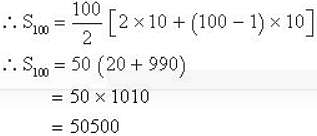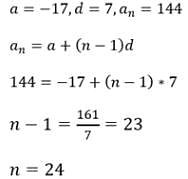JEE Exam > JEE Tests > Daily Test for JEE Preparation > Test: Arithmetic Progression (June 16) - JEE MCQ
Test: Arithmetic Progression (June 16) - JEE MCQ
Test Description
10 Questions MCQ Test Daily Test for JEE Preparation - Test: Arithmetic Progression (June 16)
Test: Arithmetic Progression (June 16) for JEE 2024 is part of Daily Test for JEE Preparation preparation. The Test: Arithmetic Progression (June 16) questions and answers have been
prepared according to the JEE exam syllabus.The Test: Arithmetic Progression (June 16) MCQs are made for JEE 2024 Exam. Find important
definitions, questions, notes, meanings, examples, exercises, MCQs and online tests for Test: Arithmetic Progression (June 16) below.
Solutions of Test: Arithmetic Progression (June 16) questions in English are available as part of our Daily Test for JEE Preparation for JEE & Test: Arithmetic Progression (June 16) solutions in
Hindi for Daily Test for JEE Preparation course. Download more important topics, notes, lectures and mock
test series for JEE Exam by signing up for free. Attempt Test: Arithmetic Progression (June 16) | 10 questions in 20 minutes | Mock test for JEE preparation | Free important questions MCQ to study Daily Test for JEE Preparation for JEE Exam | Download free PDF with solutions
Test: Arithmetic Progression (June 16) - Question 1
If “a” is the first term and ℓ is the last term (nth term), then the sum of all the term of this sequence is given by:
Detailed Solution for Test: Arithmetic Progression (June 16) - Question 1
Test: Arithmetic Progression (June 16) - Question 2
Find the sum of first hundred even natural numbers which are divisible by 5.
Detailed Solution for Test: Arithmetic Progression (June 16) - Question 2
| 1 Crore+ students have signed up on EduRev. Have you? Download the App |
Test: Arithmetic Progression (June 16) - Question 3
If the 10 times of the 10th term of an AP is equal to 15 times to the 15th term, then the 25th term is:
Detailed Solution for Test: Arithmetic Progression (June 16) - Question 3
Test: Arithmetic Progression (June 16) - Question 4
Find the missing number. 1, 4, 9, 16, 25, 36, 49, (....)
Detailed Solution for Test: Arithmetic Progression (June 16) - Question 4
Test: Arithmetic Progression (June 16) - Question 5
The first negative term of the A.P.62,57,52…. is the
Detailed Solution for Test: Arithmetic Progression (June 16) - Question 5
Test: Arithmetic Progression (June 16) - Question 6
How many terms of the series 24,20,16,…are required so that their sum is 72?
Detailed Solution for Test: Arithmetic Progression (June 16) - Question 6
Test: Arithmetic Progression (June 16) - Question 7
Roots of quadratic equation x2 – 3x = 0 , will be
Detailed Solution for Test: Arithmetic Progression (June 16) - Question 7
Test: Arithmetic Progression (June 16) - Question 8
The number of terms in the sequence -17, -10, -3,…., 144 is:
Detailed Solution for Test: Arithmetic Progression (June 16) - Question 8
Test: Arithmetic Progression (June 16) - Question 9
Three terms in A.P. are such that their sum is 45. What is the middle term?
Detailed Solution for Test: Arithmetic Progression (June 16) - Question 9
Test: Arithmetic Progression (June 16) - Question 10
The terms of an A.P. are doubled, then the resulting sequence is
Detailed Solution for Test: Arithmetic Progression (June 16) - Question 10
|
360 tests
|
Information about Test: Arithmetic Progression (June 16) Page
In this test you can find the Exam questions for Test: Arithmetic Progression (June 16) solved & explained in the simplest way possible.
Besides giving Questions and answers for Test: Arithmetic Progression (June 16), EduRev gives you an ample number of Online tests for practice



















